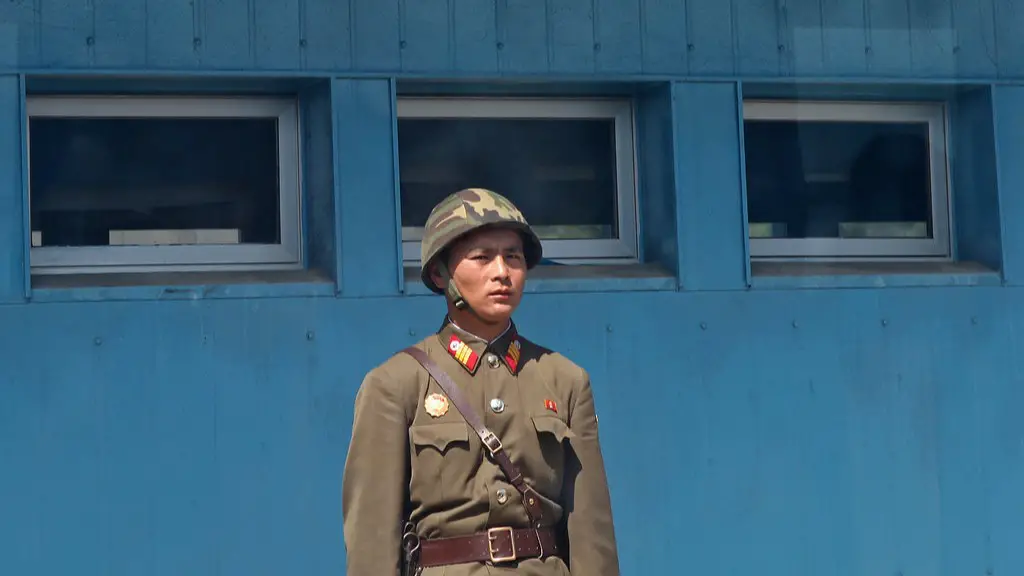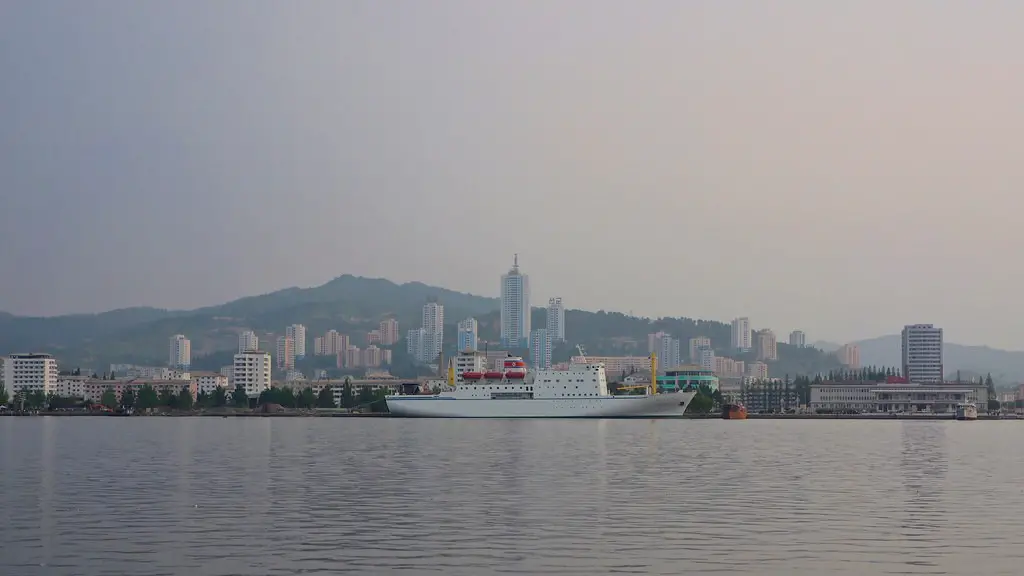Background Information
North Korea has been persistently obsessed with the idea of obtaining nuclear weapons. This has become part of the country’s official policy since the time of its founder and first president, Kim Il-sung. Kim Il-sung sought to demonstrate the power and prestige of the newly established Democratic People’s Republic of Korea (DPRK) to the international community. Since then, North Korea has invested considerable resources in its weapons program.
Techinical Capabilities
North Korea has developed considerable nuclear technical capabilities. It has conducted a limited number of nuclear tests, and its accomplishments include the enrichment of uranium and the development of long-range missiles. North Korea’s nuclear stockpile is estimated to be around 20 to 60 nuclear warheads, though some experts suggest that the number may be higher.
Rationale Behind Further Development
The main rationale behind the North Korean nuclear weapons program is the pursuit of a deterrent capacity and the protection of the country’s leadership. This includes Kim Jong-un, the current leader of North Korea. The possession of nuclear weapons is seen as a way of ensuring a certain degree of autonomy from especially powerful countries, such as the United States, which has been a historic adversary of North Korea.
The North Korean government has repeatedly claimed that it is developing nuclear weapons purely for defensive purposes, and that it is willing to engage in disarmament if certain conditions, such as the withdrawal of US troops from South Korea and the end of large-scale military exercises, are met.
Regional Context
North Korea is part of a region that is particularly volatile. There is significant animosity between North and South Korea, as well as between North Korea and the United States. This creates an environment of insecurity that motivates the North Korean government to pursue nuclear capabilities as a way to mitigate the risk of external aggression. This behavior is also encouraged by past events, such as the US-led invasion of Iraq, which signaled to North Korea that nuclear weapons may be the only way to defend itself.
International Discourse and Sanctions
The international community has condemned North Korea’s nuclear program and has imposed crippling economic sanctions in an attempt to pressure the country into halting its nuclear activities. These sanctions have been largely unsuccessful in deterring North Korea from further developing its nuclear arsenal.
The North Korean government has also been hostile and uncooperative in international diplomatic negotiations over its nuclear activities. This has been a major obstacle to finding a peaceful resolution to the conflict, as North Korea has repeatedly refused to commit to dismantlement or meaningful measures that could reduce the risk of nuclear war.
Regional Repercussions
The continued development of North Korea’s nuclear program has had severe implications for the region. North Korea has been involved in a number of military escalations with South Korea and Japan, and there is a risk of nuclear war if tensions continue to escalate. The presence of nuclear weapons also creates an additional security risk for the region, as a nuclear accident or the proliferation of nuclear technology could have catastrophic consequences.
Implications for the US
The acquisition of nuclear weapons by North Korea has significant implications for the United States. North Korea is a close ally of China and its nuclear arsenal could be used to enhance Chinese positions in global affairs. This could potentially lead to a shift in the balance of power in the region at the expense of US interests.
At the same time, the US has a vested interest in the prevention of nuclear proliferation in the region. This has been the main driving force behind its diplomatic efforts with North Korea. However, despite various attempts to engage in dialogue, North Korea has been adamant in its refusal to abandon its nuclear ambitions.
Efforts to Resolve the Issue
There have been many attempts to resolve the conflict between North Korea and the international community over its nuclear weapons program. Some of these efforts have been multilateral, such as the six-party talks between North Korea, the US, South Korea, China, Japan, and Russia. Unfortunately, these efforts have been unsuccessful in making significant progress towards resolving the conflict.
At the same time, there have been attempts by countries such as the US to engage in direct dialogue with North Korea. However, these efforts have been limited as North Korea has been uncooperative and unwilling to make concessions on the issue.
Analysis and Consequences of New Advancements
North Korea’s persistent attempts to further develop its nuclear program have resulted in a significant increase in tensions in the region. This is further compounded by North Korea’s public statements in which it has threatened to use its nuclear arsenal if provoked. This has created a precarious security situation in the region, and many countries fear that an accident or provocation could lead to a nuclear war.
At the same time, North Korea’s nuclear ambitions have also resulted in increased restrictions imposed by the international community. This has severely impacted North Korea’s economic prospects, as the country has been isolated by economic sanctions and the closure of trade and financial networks.
Implications for International Security
The continued development of North Korea’s nuclear capabilities has significant implications for the stability of the international system. The continued possession of nuclear weapons by North Korea is seen as a major threat to global security, as a nuclear war could lead to devastating consequences.
At the same time, this situation also creates opportunities for other countries to exert power in the region. North Korea’s nuclear weapons program has provided China with considerable leverage, as the Chinese government has maintained close ties with North Korea despite economic sanctions, and has used these ties to enhance its international position.
The Role of the US
The US has been at the forefront of attempts to resolve the conflict over North Korea’s nuclear weapons program. The US has engaged in diplomatic talks with North Korea, and has pushed for the implementation of economic sanctions in an effort to pressure North Korea into halting its nuclear activities.
At the same time, the US has also sought to strengthen its regional alliances and bolster its military presence in the region in an effort to deter North Korea from further developing its nuclear arsenal. This has created a balance of power in the region which, while volatile, has so far been effective in containing North Korea’s nuclear ambitions.
Changing Narrative and International Reactions
The international community has been largely united in its condemnation of North Korea’s nuclear weapons program. However, there has been a subtle shift in the international narrative with regards to the conflict, as many countries have begun to prioritize the need for dialogue and diplomacy over economic sanctions and military posturing.
The US and South Korean governments have publicly declared their willingness to pursue a diplomatic solution to the conflict and have recently engaged in historic talks with North Korean officials in an effort to de-escalate tensions. This has been met with cautious optimism by the international community, as it provides a glimpse of hope for a peaceful resolution of the conflict.



